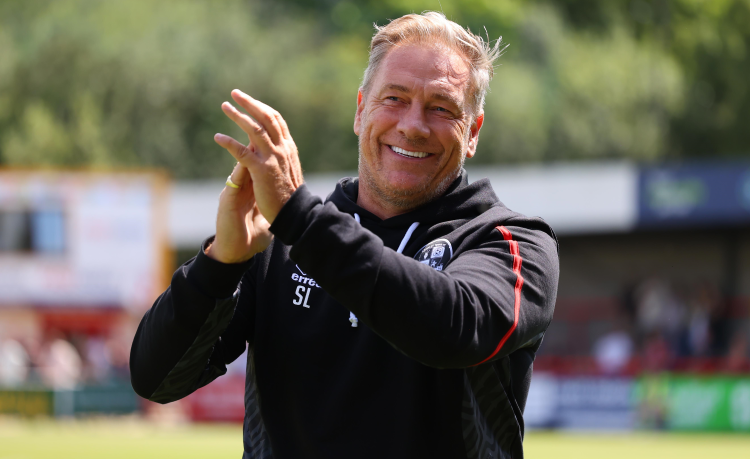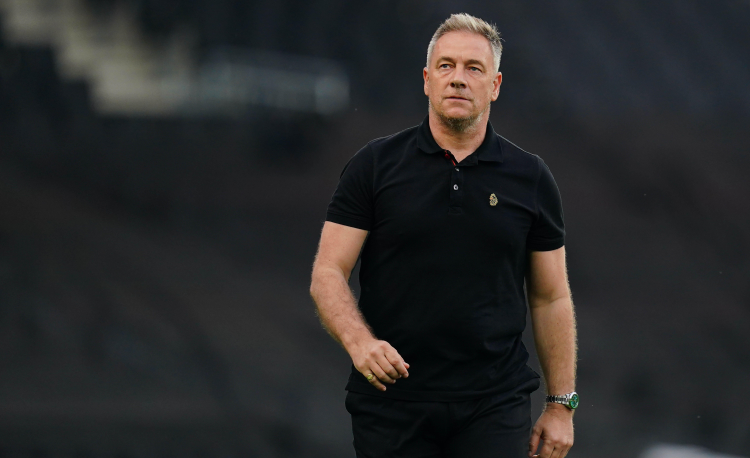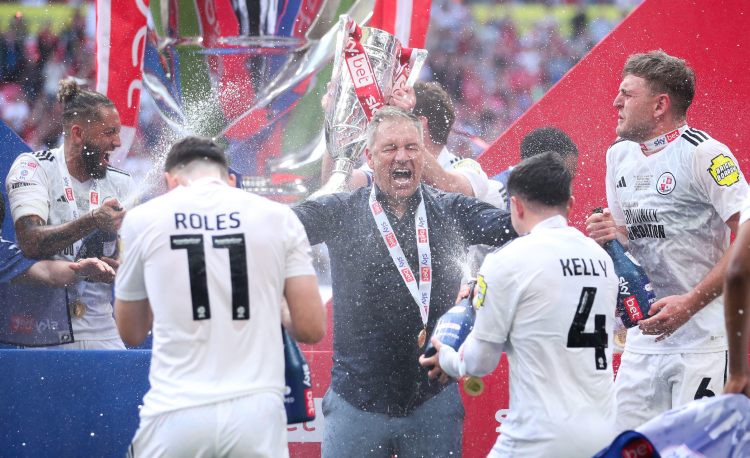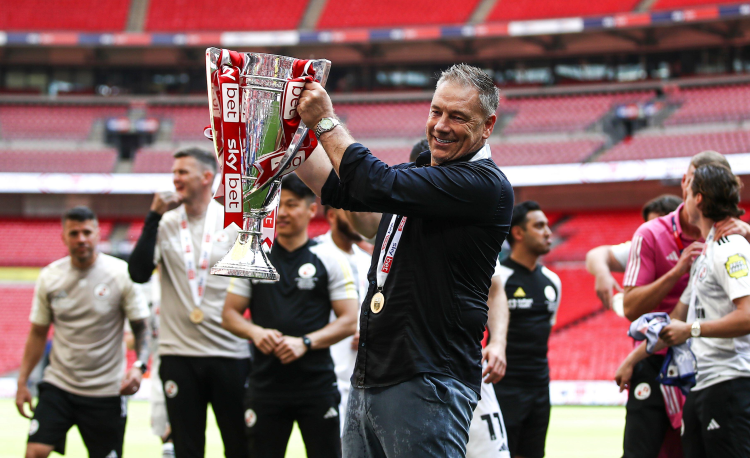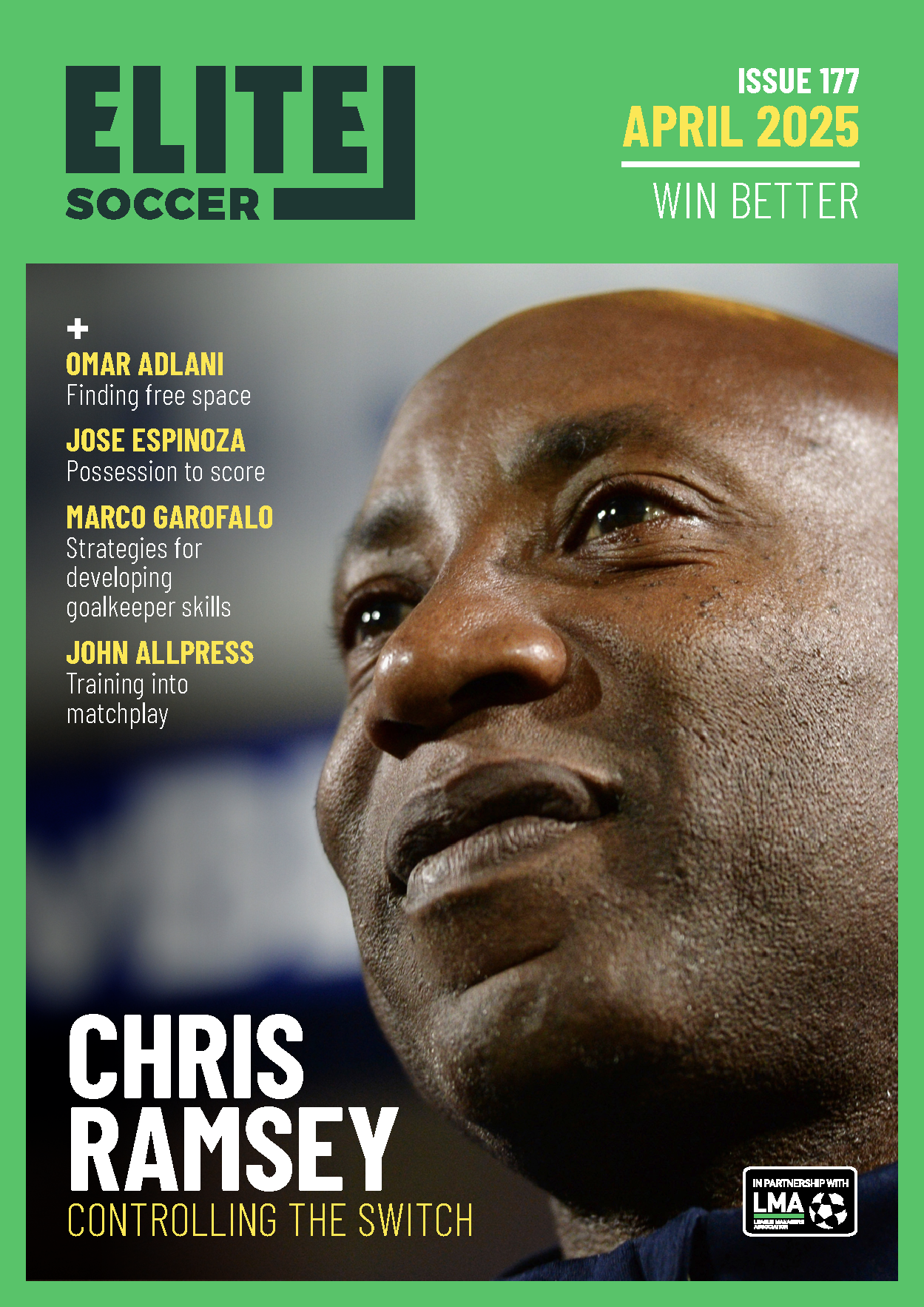You are viewing 1 of your 1 free articles
The Crawley Town manager talks to Carrie Dunn about his unconventional path to coaching success
Lindsey on his coaching journey
It wasn’t really until I got on my A licence that I actually thought, ‘I’m not bad at this, you know, if I do say so myself!’ I was little old Scott Lindsey from non-league, I had a non-league career as a player, and I actually was on the course with some big names, and people who made a name for themselves in the Premier League and the Scottish Premier League. I backed myself to be just as good as these guys, and I was really confident. I trusted myself, and I believed in what I believed in, and I got a job off the back of it. Chris Sutton was on the course and was lining up a managerial job, and said he would like me to come and work with him, and stuck to his word and took me on as coach at Lincoln. That was my first rung on the ladder in terms of first-team football.
I moved out of coaching when my wife Hayley was ill so I could care for her, and she encouraged me to go and get a part-time job coaching locally because she knew how passionately I felt about it. A job came up which was really local to me, but it was so far down the football pyramid, a lot of people were telling me not to do it, but I wanted to do it because I absolutely loved doing it, and it suited my situation at home, I was caring for Hayley 24/7 and there was an opportunity for me to go out for two hours on a Tuesday night, hour and a half on a Thursday night, and 90 minutes on a Saturday, and she she supported that.
After Hayley passed away, I felt a real urge to get back into the professional game again, so I worked extremely hard in the background to network. Ben Garner got the manager’s job at Swindon, and I went in with him as his assistant, Then Ben moved on to Charlton, and they gave me the head coach’s job. I went from being a manager in the ninth tier of football to all of a sudden I was a manager in the Football League in a matter of months.
I’d been in the game in a long, long time in terms of being an assistant manager, but I’d always wanted to be a manager, I’d always wanted to make the tough decisions, but I always felt that maybe I might miss the boat and maybe I might not get the opportunity through circumstance more than ability. But it came eventually, and I was 50 years of age when I first got my first managerial job in the Football League, and I was more than equipped to do the job, more than equipped with the years of experience of being somebody’s number two and first team coach and youth team coach and all the roles that I’ve done.
Football management is a really, really tough industry. You have to be brave, you have to have a lot of courage, you have to be able to be thick-skinned to bat off criticism. Sometimes winning a game of football is the best feeling ever, and losing a game of football’s the worst feeling ever. But I’ve got to be honest with you, I always think back to those three months of me caring for Hayley and her passing away, and I’ll think to myself when we’re losing a game away from home, and it’s pouring down with rain, and it’s tough, I always think, ‘It’s not as tough as what I’ve been through.’ I’m not a coach with any fear. What’s the worst that can happen? I’ve seen the worst thing happening: my wife passed away, and my children saw it happening, so nothing can ever be worse than that. I use that as courage for me now, in a real dog-eat-dog environment. I don’t want to come across like this is easy, but compared to what I’ve been through, it’s a pleasure to be in a job like this.
CRAWLEY TOWN
EST. 1896
Overview
League: EFL League One
Head coach: Scott Lindsey
Location: Crawley, West Sussex, England
Ground: Broadfield Stadium
Capacity: 6,134
Lindsey on his footballing philosophy
I tell my players to be insulted if the opposition have the ball. We’re very aggressive to get it back. I just love watching Spain, the way they play, their domination of possession, their aggression on the press, their use of the whole pitch in terms of their positioning.
I’ll never, ever change the way I think about football, no matter how hard it gets, no matter how bad the results go, we will double down on it. I want my players to feel that I’ve got a real belief and confidence in what I coach and I will never, ever be dented by anything that happens. We will always play with the ball, play out from the back, play through the thirds. I might not always get it right, but I coach complete dominance of possession and an aggressive manner.
Lindsey on what he learnt as an academy coach
You pick up from all your experiences. I’ve got a young player in at the moment, literally just fresh out the academy, and I know how to speak to him. I can see him beating himself up when things don’t go quite right. So I pull him to one side, put my arm around him, and tell him to be less hard on himself, and to be confident and enjoy the moments when you do well. It’s just little things like that that I remember from when I worked in an academy. It’s care and trust you want to build with them, for them to feel they’re in a safe learning environment. I’m big on the players being happy in my environment, even if they’re not playing. You know what football is like. They want to play. Not all of them can. So we have to build a real happy environment in which the players feel safe, they feel wanted, and they feel as if they can learn.
Lindsey on creating stability at Crawley
The secret is just really, really long hours and hard work and also being ruthless as a manager, because the environment when I went in wasn’t right, and I had to get the environment right, I had to get the culture right. In order to get the culture right, you may have to change personnel. It’s harder to do that with players because they’re obviously under contract, but over time we did. I put really strict rules in place when I first came into the club. I knew a lot of the players would fall by the wayside, and they couldn’t keep up with these rules. If you’re going to play for me, you had to run. If you didn’t run, then you sat down with me on the bench and you didn’t play. People started to think really quickly, ‘Wow, this guy means business.’
The biggest task to start with was to keep them up. They were third from bottom when I went in. So I had to be smart about that. I knew how I wanted to play, but I didn’t think that this group of players could do that, so I had to water down what my beliefs were in order for me to get the job done. We managed to stay up by three points, and then it was time to go to work. Everyone thought, ‘Oh, you’re a hero, you’ve kept us up,’ and in my mind, I’m thinking, ‘I haven’t even started yet.’
The recruitment was really good that summer, we found potential from lower leagues. I didn’t care where we were signing these players from, I just wanted fresh faces in, because I knew I was going to coach the life out of them, and I did. All the bookmakers and pundits thought we were going to go down, and I got in a room with my players, closed the doors and windows and said: “Listen to that outside noise. Please use it to fuel us, because we are not going down. That is a fact. We’re going to do something special, but only us in here know that.”
The first game of the season, we played Bradford City, one of the teams in the promotion hunt, and we beat them. The second game, we played Salford, who were in the play-offs the season before. We drew the game, but we were better than them. The third game we played was MK Dons, who had just come down from League One, so a big side, big club, good players, and we beat them. Then all of a sudden, you could see that the players think, ‘Hold on a minute. We could do something.’
We’ve got this togetherness, and we use it as an us against the world mentality. It really works.
Lindsey on the play-offs
I didn’t have to manage myself or my emotions because I felt as if this is what I was made to do. I felt really confident. I called it the law of attraction to the players; the more I said we would do something special, the more they started believing it. When it got to the back end of the season, I kept saying, ‘Nobody is really taking charge of that final play-off spot. Everyone’s messing around with it. Everybody wants that final play-off spot, but nobody’s doing anything about it. If we do something about it, I’m telling you now, I will back us against anybody across two legs in the semi-finals, and I’ll back you against anybody at Wembley. If we get in that last place, we’ll get promoted.’
Playing MK Dons in the semi-final was a tough task in itself, because we knew Mike Williamson is a very, very good manager. They’ve got excellent players. They have a really clear way of playing which is not too dissimilar from the way we play – leading into the play-offs, I enjoyed my time watching them. We won 3-0 in the first game at our place, and I felt that I got my tactics spot-on. I remember being interviewed before the second game and being asked, basically, ‘Do you stick or twist? You’re 3-0 up. Do you park the bus?’ I was like, ‘Nah, we’re not parking no bus, mate. We’re all-out attack again. We’re going to go for it and press and we’re not going to change. I won’t change.’ We went into that second leg with the same attitude as we did the first. In that first game, I didn’t want to be cagey. I didn’t want to sit in and see what they were doing. I wanted us to step forward and take the game to them, and we did, and then I said to the players, ‘We are doing that again when we play at their place. We’re not going to come off the gas, we’re going to step forward, we’re going to try and score early. We’re going to try and put this game to bed.’
We ended up winning 8-1 on aggregate, and I honestly believe it was those two games that won us promotion. We would have gone from Milton Keynes that night we played them, straight to Wembley, played Crewe and beaten them. That’s how fired-up the players were, and I had to calm them down.
Related Files
Lindsey on Wembley
The boys were ready. They were so ready. I calmed them down a little bit and just said, “Look, I want you to play the game and not the occasion. I know it’s a cliché, but it’s true. This is a game of football. Forget the stadium, forget the surroundings, forget the big crowd. We’re here to do a job. Yes, it’s a brilliant day out for all our families. Yes, it’s a brilliant day out for all the fans. We’ve made history by just being here, boys. I’m not here just to make history. I want to win.”
I tried to make the lads focus on their job as individuals and collectively, as a team, and we really had the mindset to go and do that job. We sorted all the match tickets out on one day, we did all our media on one day, and then spent the three days before the match concentrating on the job of playing football and beating Crewe. Because the boys were so confident, they were never going to lose that game.
Editor's Picks
Attacking transitions
Deep runs in the final third
Using the goalkeeper in build-up play
Intensive boxes drill with goals
Penetrating the final third
Creating and finishing
My philosophy
Pressing initiation
Compact team movement
Coaches' Testimonials
Coaches' Testimonials
Join the world's leading coaches and managers and discover for yourself one of the best kept secrets in coaching. No other training tool on the planet is written or read by the calibre of names you’ll find in Elite Soccer.
In a recent survey 92% of subscribers said Elite Soccer makes them more confident, 89% said it makes them a more effective coach and 91% said it makes them more inspired.
Get Monthly Inspiration
All the latest techniques and approaches
Since 2010 Elite Soccer has given subscribers exclusive insight into the training ground practices of the world’s best coaches. Published in partnership with the League Managers Association we have unparalleled access to the leading lights in the English leagues, as well as a host of international managers.
Elite Soccer exclusively features sessions written by the coaches themselves. There are no observed sessions and no sessions “in the style of”, just first-hand advice delivered direct to you from the coach.
